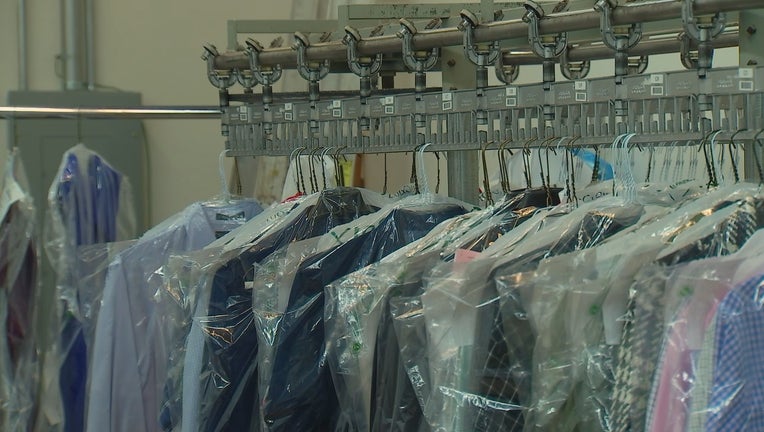Minnesota Dry Cleaners Association: Revenue is down more than 60 percent because of pandemic

Dry cleaners are among the industries struggling during the pandemic. (FOX 9)
ST. PAUL, Minn. (FOX 9) - Inside St. Croix Dry Cleaners, owner Dave Nemec stood in front of hanging rails used for clothes that have been freshly cleaned and pressed.
"Normally this conveyor would be 100% full,” he told FOX 9 during an interview.

Dry cleaners struggling through pandemic
The pandemic has effective virtually every business sector, all the way down to dry cleaning.
But then the pandemic hit. Clothing racks once filled with clothes for special occasions such as weddings, holiday parties, and business meetings are now empty.
More people staying home to stop the spread of the coronavirus means people are going out less. That’s having an impact on Nemec’s business.
“There [have been] many sleepless nights in the last year,” he said.
Nemec and his wife are investing their life savings in their business to keep the business running. He worries not only about the nest egg he planned to use for their retirement but for his staff. When shutdowns began in March, he laid off two-thirds of his team.
“In the 20 years I’ve been in business, I never laid off one employee,” he said. “To make 90 phone calls and lay off 90 people was the hardest thing I’ve ever done.”
Minnesota Department of Employment and Economic Development (DEED) data shows that laundry services are down by more than 30%. Since March, Nemec has closed down two of the locations because the demand isn’t there anymore.
And he’s not alone.
“We’ve already lost ten dry cleaners in the state of Minnesota which represents about 10 to 15% of the total in the state” said Keith Aune, president of the Minnesota Dry Cleaners Association.
Aune, who is also the owner of Clean N’ Press Dry Cleaners, laid off more than half of his 100 employees. He said the industry has gone through tough times, including the recession, but nothing like this.
“Going forward I really think the dry-cleaning industry is going to have to be creative and continue to work hard and do other things to stay afloat,” said Aune.
He added that while the industry has gotten creative during the global health crisis, including expanding delivery and offering in-home laundry services, the efforts might not be enough.
“I’m worried that post-COVID-19, once we finally get things taken care of, we’re probably going to be an industry that’s going to be 70 to 75 % of what it was before,” he said.

